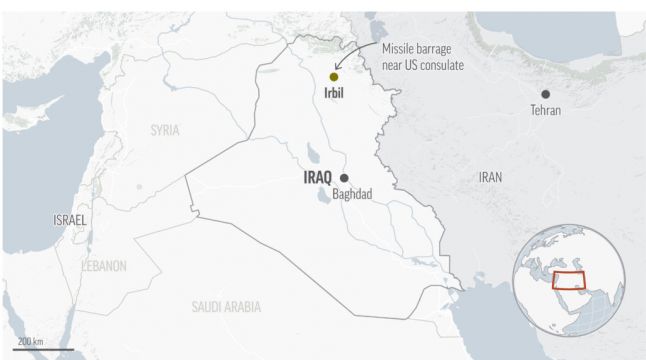Iran has claimed responsibility for a missile barrage that struck near a sprawling US consulate complex in the northern Iraqi city of Irbil on Sunday, saying it was in retaliation for an Israeli strike in Syria that killed two members of its Revolutionary Guard.
Iraq’s foreign ministry summoned Iran’s ambassador to protest against the attack, calling it a flagrant violation of the country’s sovereignty.
No injuries were reported in the attack, which marked a significant escalation in hostilities between the US and Iran that have often played out in Iraq, whose government is allied with both countries.
The attack drew harsh condemnation from the Iraqi government, which called it a “violation of international law and norms” and demanded an explanation from the Iranian leadership.
Iraq’s foreign ministry spokesman Ahmad al-Sahhaf told The Associated Press that the ministry had summoned the Iranian ambassador, Iraj Masjedi, to deliver the diplomatic protest.
The United States said the missile strike emanated from Iran and strongly condemned it.
“The strikes were an outrageous violation of Iraq’s sovereignty. No US facilities were damaged or personnel injured, and we have no indications the attack was directed at the United States,” state department spokesman Ned Price told reporters in Washington.

Iran’s Revolutionary Guard said on its website that it launched the attack against an Israeli “strategic centre of conspiracy” in Irbil. It did not elaborate, but in a statement said Israel had itself been on the offensive, citing a recent strike that killed two Revolutionary Guards.
The semi-official Tasnim news agency quoted an unnamed source as saying Iran fired 10 Fateh missiles, including several Fateh-110 missiles, which have a range of about 186 miles (300km).
The source said the attack resulted in multiple casualties and that the main target for the missiles was the “Zionist base, which is far from the American military base”.
An Iraqi official in Baghdad initially said several missiles had hit the US consulate in Irbil, which is new and unoccupied, adding that it had been the intended target of the attack.
Advertisement— U.S. Consulate General Erbil (@USConGenErbil) March 13, 2022
Later, Lawk Ghafari, the head of Kurdistan’s foreign media office, said none of the missiles had struck the US facility but that areas around the compound had been hit.
Following a cabinet meeting, the Iraqi government in Baghdad reiterated its refusal to allow Iraq to be used to settle scores between other countries and said it had requested an explanation from the Iranian leadership.
Satellite broadcast channel Kurdistan24, which is located near the US consulate, went on air shortly after the attack, showing shattered glass and debris on its studio floor.
The attack came several days after Iran said it would retaliate for an Israeli strike near Damascus in Syria that killed two members of its Revolutionary Guard.
On Sunday, Iran’s state-run Irna news agency quoted Iraqi media acknowledging the attacks in Irbil, without saying where they originated.
The missile barrage coincided with regional tensions.

Negotiations in Vienna over Tehran’s nuclear deal hit a “pause” amid Russian demands on sanctions targeting Moscow over its war on Ukraine.
Meanwhile, Iran suspended its secret Baghdad-brokered talks aimed at defusing years-long tensions with regional rival Saudi Arabia, after Saudi Arabia carried out its largest known mass execution in its modern history with more than three dozens Shiites killed.
The Iraqi security officials said there were no casualties from the Irbil attack, which they said occurred after midnight and caused material damage in the area.
One of the Iraqi officials said the ballistic missiles were fired from Iran, without elaborating. He said the projectiles were the Iranian-made Fateh-110, likely to have been fired in retaliation for the two Revolutionary Guards killed in Syria.
US forces stationed at Irbil’s airport compound have come under fire from rocket and drone attacks in the past, with American officials blaming Iran-backed groups.
The top US commander for the Middle East has repeatedly warned about the increasing threats of attacks from Iran and Iranian-backed militias on troops and allies in Iraq and Syria.







